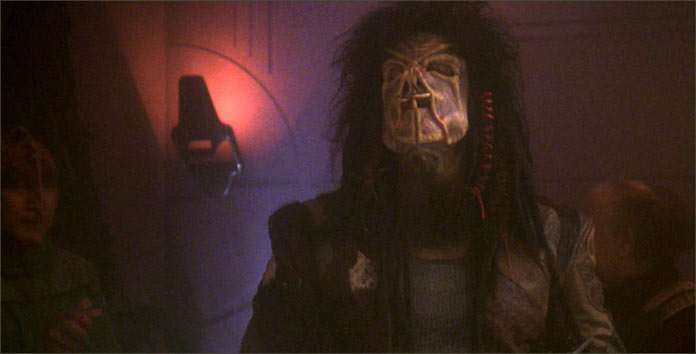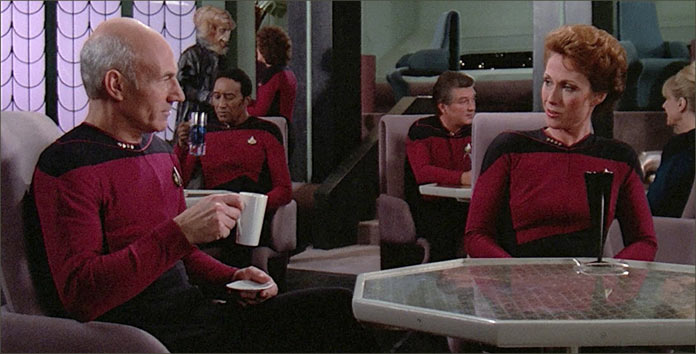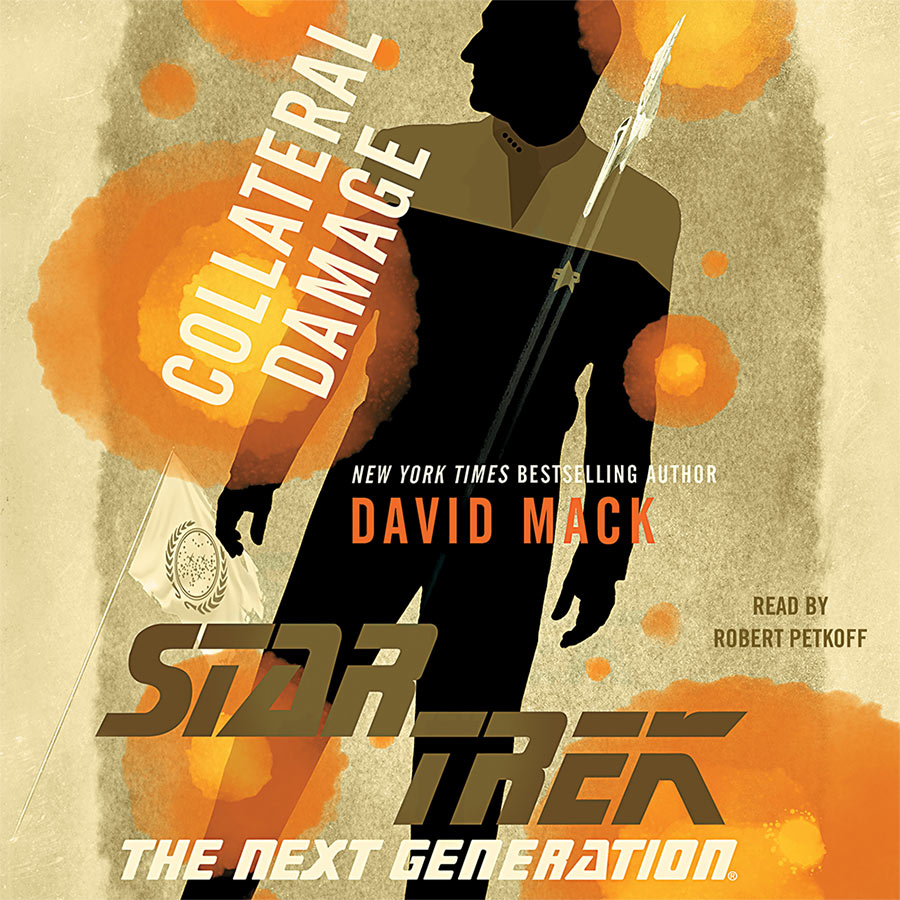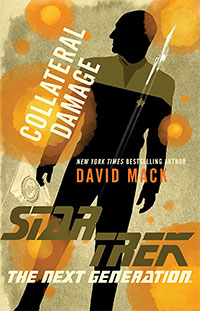From the New York Times bestselling author of Star Trek: Discovery: Desperate Hours comes an original, thrilling novel set in the universe of Star Trek: The Next Generation!
The past returns to haunt Captain Jean-Luc Picard — a crime he thought long buried has been exposed, and he must return to Earth to answer for his role in a conspiracy that some call treason.
Meanwhile, the U.S.S. Enterprise is sent to apprehend pirates who have stolen vital technology from a fragile Federation colony.
But acting captain Commander Worf discovers that the pirates’ motives are not what they seem, and that sometimes standing for justice means defying the law….
David Mack has something to say.
Collateral Damage, his new Star Trek: The Next Generation novel, is the most topically allegorical Star Trek novel since his 2016 novel Section 31: Control. But the allegory rests far less in the character on the cover – Jean-Luc Picard – than it does in the storyline that runs parallel featuring the crew of the Enterprise.
Picard’s story is an important one, as it wraps up a storyline first started in the A Time to… series in the early 2000s, however Picard’s story is actually not the main thrust of the novel. In fact, like Available Light before it, the Section 31 fallout and the repercussions for Picard are actually the secondary story of the novel.
While that may ultimately feel like a smidge of false advertising, the main events of the novel involving the Enterprise are utterly gripping.
Collateral Damage is very well titled because it’s what both storylines in the novel are about. The book explores collateral damage from the fallout of the destruction of Section 31, the collateral damage of that organization’s assassination of Federation President Min Zife in the 2004 novel A Time to Heal, as well as collateral damage from the Borg invasion in David Mack’s epic 2008 Destiny trilogy.

While Captain Picard appears before a formal Starfleet inquiry to decide if he should be forced to undergo a court martial, the Enterprise chases a group of renegade Nausicaans across half the quadrant to retrieve a weapon of mass destruction that they have stolen. With the help of a very surprising trio of characters (from the second and seventh seasons of The Next Generation, and a recurring role in Voyager) the Enterprise pursues the Nausicaans after a Starfleet Intelligence operation gone wrong.
But these are not unsympathetic villains. The Nausicaans, whose home was destroyed by the Borg invasion, are a desperate people. Mack imbues the race with significantly more depth and pathos than their previous appearances in the Star Trek canon where they were stereotypical thugs. And the resolution to the story is exactly the kind of resolution you want to see from Star Trek – learning, growing, and understanding. It’s a poignant story, made even more so by the strong parallels to real life.
Mack’s ability to make the plight of the Nausicaans more sympathetic is aided by his use of a fresh literary device (for Star Trek books at least); switching tenses between the first and third persons. The story of the main Nausicaan antagonist, Kinogar, is told entirely in the first person, which makes it much easier to feel for these characters and understand their motivations.

The theme of Collateral Damage is about the impact that your choices can have on other people. But it also seems that one of the underlying messages is that not all villains are strictly villains. This is certainly true of Kinogar and the Nausicaans, but it’s also true of Picard’s adversary in the courtroom storyline, Federation Attorney General Phillipa Louvois.
Though she is largely portrayed as an unsympathetic character in the novel, ruthlessly prosecuting Picard for his role in a murder he knew nothing about, her motivations are neither altogether evil nor impossible to understand. After the final courtroom confrontation, there is a quiet scene between Picard and Louvois that explores how far their relationship has come, and what has been lost in the process.
The courtroom drama features a number of common court room tropes, like a ruthless prosecutor and a charismatic defense attorney. Ultimately, it’s also a little predictable, but it is also very well executed and will be an easy read for fans of lawyer shows like Law & Order.
And ultimately, the pomp and procedures are less important than the impact the legal proceedings have upon Picard. The most interesting parts of the Picard storyline are the moments of introspection and reflection of the character, and less the specific twists and turns of legal minutiae.

On top of all that, Collateral Damage is absolutely chock full of references to previous Star Trek novels. It is unclear at this point what will happen to the literary universe that many authors have built over the last two decades with the premiere of Star Trek: Picard in January and the release of the first tie-in novel connected to that series, February 2020’s Last Best Hope.
At STLV earlier this year, Simon & Schuster editor Ed Schlesinger said that they were taking the fans’ longstanding support for this story very seriously as they considered what would come next. We don’t know exactly what that will be yet — though both David Mack and Dayton Ward have indicated they are conspiring together on… something — but if this is to be the last Star Trek novel in the current literary continuity it is as fitting an ending as one book can be.
While there are many storylines left hanging across multiple eras, Collateral Damage is a good end to several story threads from the nearly two decades of the shred continuity of Star Trek novels. This book provides suitable epilogues to the A Time To… series, the Section 31 series, the Destiny series, and even briefly the Star Trek: Titan series of novels.
There are also lots of easter eggs thrown in to appeal to longtime book readers that you’ll enjoy re-reading to find, including a sneaky New Frontier shout out I particularly liked.

Also, the cover art on this novel is really great. A lot of the book covers have been pretty hit or miss the last few years. Hopefully Collateral Damage signals a new design direction for the novel covers and if so, it is a very welcome one.
Collateral Damage is a typically great book from David Mack, with plenty of action, legal drama, and thoughtful exploration of topical social and moral issues. And ultimately, the book ends exactly how it should – boldly going where no one has gone before.
What better ending can you ask for than that?

